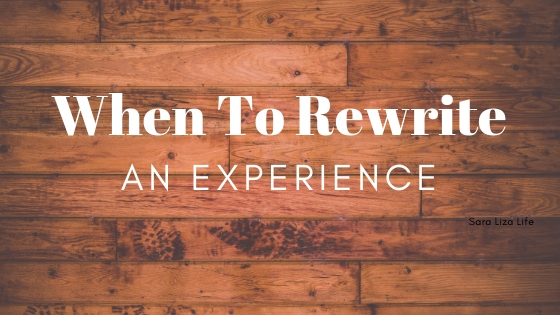When to Rewrite an Experience
You may wonder how to know when to rewrite an experience. That’s a good question. Let’s explore some examples so you can start examining your own life and figuring out when to rewrite.
Rewrite When You Overreact
Have you ever had an experience where you overreacted to someone or something? Maybe you were having a conversation with someone close to you and all of a sudden you lost it and started raising your voice, becoming physically domineering, or attacking verbally.
Maybe you were going along in a conversation with a co-worker or boss and things seemed to be fine when all of a sudden you stiffened and felt your teeth or hands clench. Or maybe you started defending yourself or God-forbid you broke down in tears.
Later after you calmed down you wondered why you reacted so strongly. You feel embarrassed and wonder why you did that, or if it’s a recurring theme, why you do that.
Trust me, you’re not alone, and this is a great time to rewrite!

Rewrite When You Feel Out of Sorts
Do you ever have those days when nothing seems to be going right? You keep dropping things, running into things, or forgetting things. Nothing seems to work for you and everything is taking 10 times longer than it should.
Or maybe you just don’t feel right emotionally. You know something is bothering you, but you don’t know what. This is a great time to get a lone with yourself and rewrite an experience.
Rewrite When You Get Stuck
Sometime in our lives we all feel stuck, unable to move forward in something we want to do. This is another excellent time to rewrite an experience. I’ve found this to be true in many cases in my life. Maybe it’s a new healthy lifestyle you’re trying to implement, but you just can’t seem to do it.
Possibly you want to break away from your 9-5 job and do something different with your life, go back to school, or step out in a hobby that you want to pursue. But no matter how hard you try, you just can’t make yourself do it. It’s as though a voice in your head is saying, “Hell no! You’re not going to do that!” And the voice wins.
Rewrite When You Want to Cope
If you’re like me, you know exactly what coping is. It’s likely something you learned at a very young age–a way to make yourself feel better in the face of trauma or other difficult circumstances. My vice: excessive eating, especially sweets. Maybe that’s yours too. Here’s a list of common coping mechanisms:
- Overeating food/sweets
- Bingeing
- Purging
- Drinking
- Drugs
- Smoking
- Sex/affairs
- Shopping
- Gambling
- Watching movies/TV
- Isolation
- Excessive reading
- Pornography
- Partying
- Excessive screen-time (computer/phone/tablet)
- Cutting/self-mutilation
- Hoarding
Growing up, these coping mechanisms may have helped us survive horrific circumstances. However, as adults we now have choices of what we want to keep and what we want to get rid of. So rewriting experiences that are sending you to your favorite coping mechanism is an excellent way to change these patterns.
Rewrite When You Feel Negative Emotions
All over the internet and in his books, you’ll find David Hawkins’ Map of Consciousness. People calibrate at a certain level overall in life and at different levels at certain times in their lives. When I began my healing journey I calibrated and the lowest level: Shame. Hawkins refers to this level as “perilously proximate to death.” That’s where I was living. Truly, I believe that’s where many people are living, especially if you’ve suffered childhood trauma.
Here is a list of the levels of consciousness below courage. Shame is the lowest level and is almost physically and emotionally dead. It is the most difficult place to
To live a healthy fulfilled, productive life we need to be living above courage most of the time, although we can fluctuate as circumstances affect us. It’s not always bad to be in one of these levels, but to stay there is where the problem lies. Below each level, you’ll find the God-view, life-view, emotion, and process you’re in at that level.
- Pride
- God is indifferent
- Life is demanding
- The emotion you may feel is scorn
- To cope you self-inflate
- Anger
- God is vengeful
- Life is antagonistic
- The emotion you may feel is hate
- To cope you use aggression
- Desire
- God is denying
- Life is disappointing
- The emotion you may feel is craving
- To cope you enslave yourself
- Fear
- God is punishing
- Life is frightening
- The emotion you may feel is anxiety
- To cope you withdraw
- Grief
- God is disdainful
- Life is tragic
- The emotion you may feel is regret
- To cope you may become
desponden
- Apathy
- God is condemning
- Life is hopeless
- The emotion you may feel is despair
- To cope you give away your power and give up
- Guilt
- God is vindictive
- Life is evil
- The emotion you may feel is blame
- To cope you may cause destruction or hurt yourself
- Shame
- God is despising
- Life is miserable
- The emotion you may feel is humiliation
- To cope you may try to eliminate yourself in every way including denying your desires, hiding physically and/or emotionally and possibly wanting to die
- Conversely, some people who live in shame become narcissists so that everything is about them so that they don’t have to feel their shame
Become Self-Aware
One of the easiest ways for me to tell that I need to rewrite a negative belief about myself, others, and the world is when I’m at one of these levels. If you feel like punching your hand through a wall, throwing someone off a bridge, crashing your car, or otherwise causing some sort of physical harm: rewrite time.
If you’re incessantly moved to tears, they keep welling up in your eyes, and you really don’t have anything
When you are stuck in a funk and just can’t seem to get out: rewrite time.
When you feel any of those negative emotions, or anything related to them, it’s time to check in with yourself, see what experience comes up, and rewrite it.
Links to Other Pages About Rewriting Your Life
There is Hope in Rewriting Your Life



